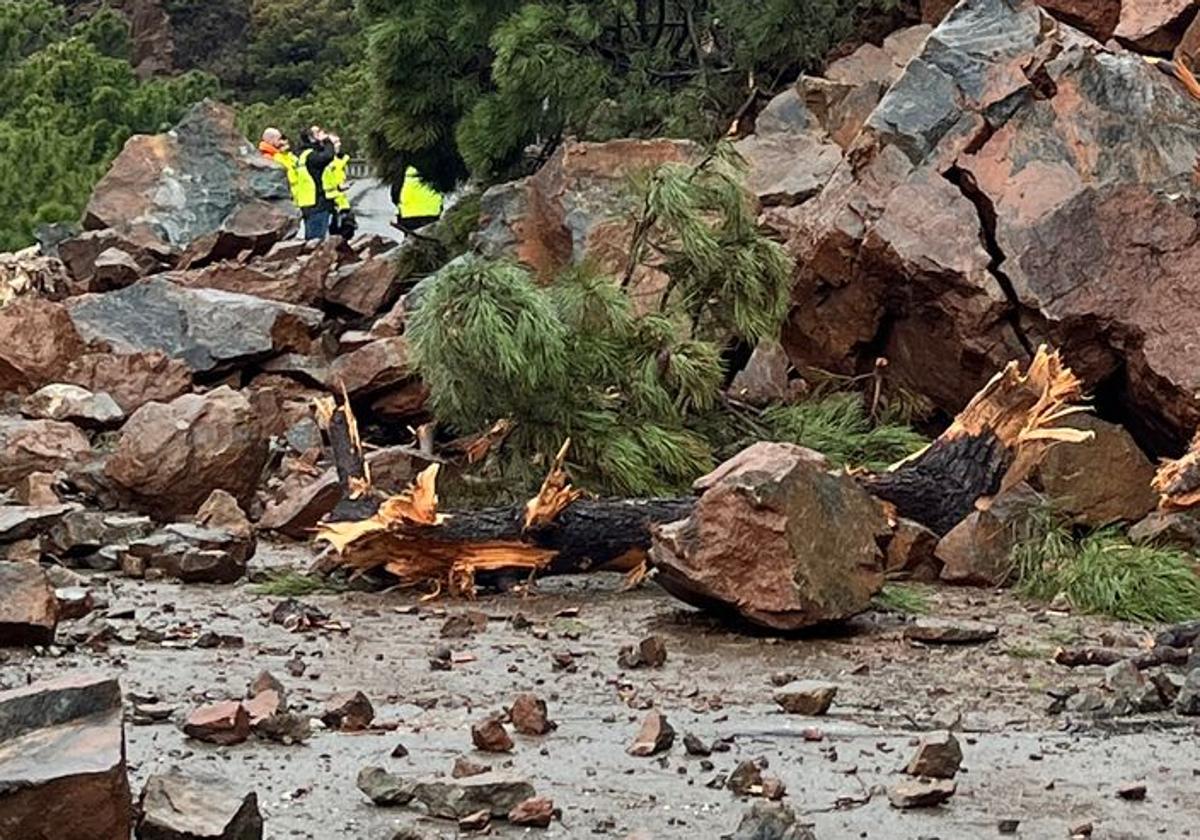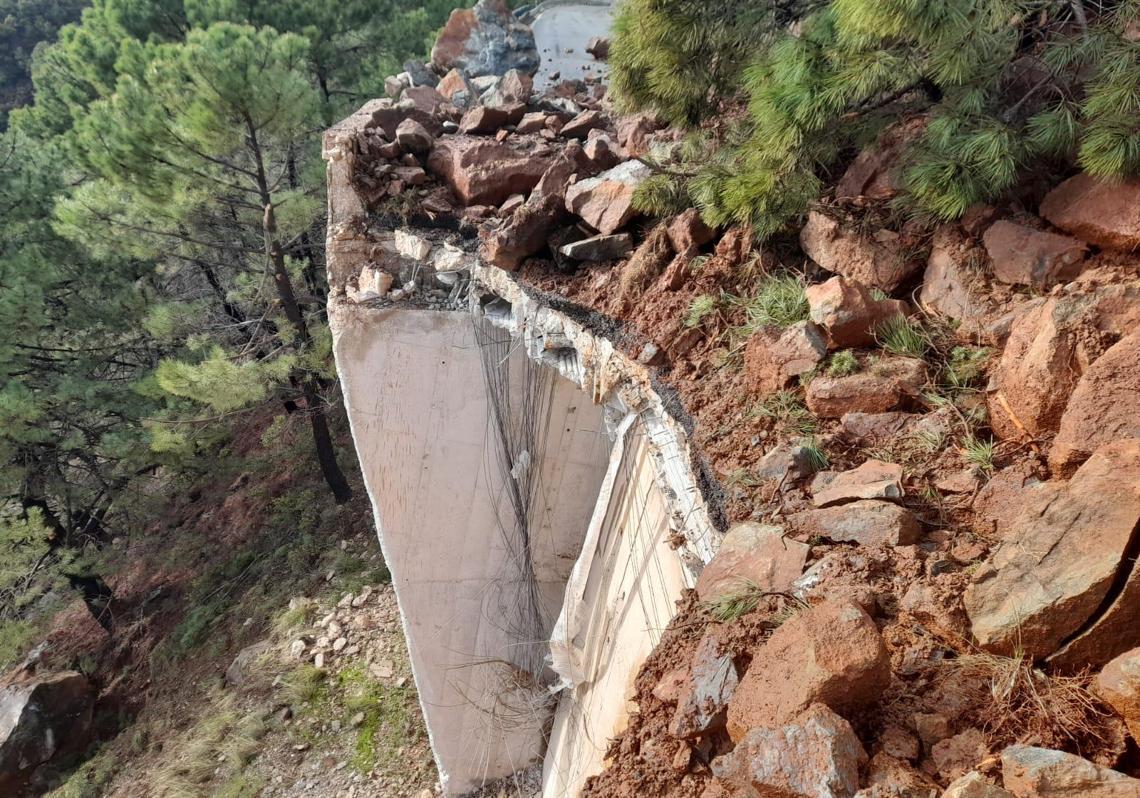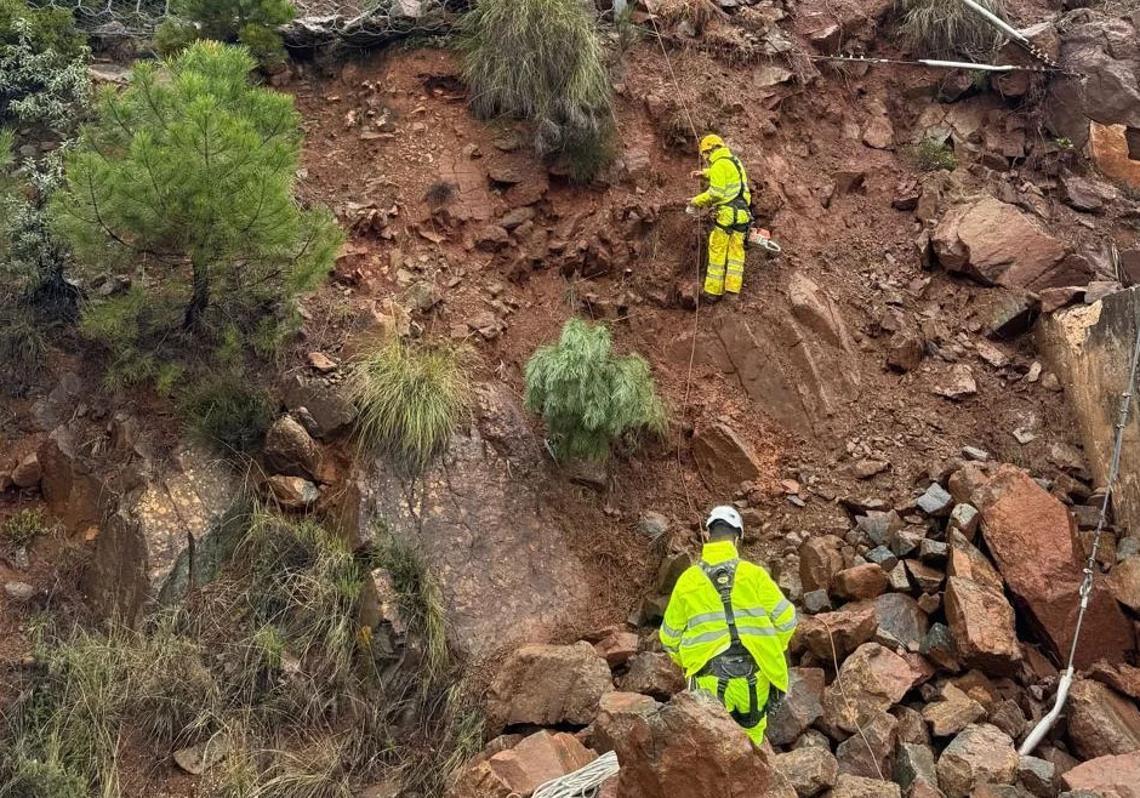

Sections
Highlight

The 'bread road'. This is how the A-397 between Ronda and San Pedro Alcántara is known as people use it to 'make their daily bread', their living. This road has been closed to traffic since 8 March as a result of a landslide over a bridge in the municipality of Benahavís due to the recent heavy rains, and the repair work required before it can fully reopen will take six months. This has forced the thousands of people who use this road every day to get to work or for tourism to seek alternative routes, with the consequent increase in travel time and costs, while at the same time altering the routines of the inhabitants of the area with regard to how they get around for health, education, shopping or leisure needs. Moreover, this unforeseen event has served to highlight the weaknesses and shortcomings in terms of transport communications in these more mountainous places inland. The terrain without a decent road network dictates and hinders the development of the area in terms of competitiveness, employment opportunities and population growth.
"The weakness of communications in the area is becoming clear. As soon as a road is cut off, we are very restricted and it is noticeable in all activities. The development of Ronda is very much governed by communications," said Antonio Palma, secretary for Apymer (an association for the SMEs in Ronda and Campillos-Guadalteba). "This situation has shown that the historic demand for communications in the Serranía has now become an imperative", stresses Ronda's mayor, Maripaz Fernández (PP party). "The basic problem, which has not been solved for quite some time, is that of communications," adds Francisco Javier Anet, mayor of Arriate (PSOE), a position shared by his counterparts in Gaucín, Pedro Godino (PP), Benarrabá, Silvestre Barroso (PP), and Genalguacil, Miguel Ángel Herrera (PSOE).

In addition to calling for the A-397 to be repaired as soon as possible, the main demand from the area is to push forward the dual carriageway connecting Ronda with Malaga via the A-357. This long-awaited project is progressing at a slow pace for an area where there is not a single stretch of dual carriageway, not even one centimetre, in the 1,253.80-square kilometres of the 23 municipalities that make up the area. Ronda, as the capital of the Serranía, is the Spanish town with over 30,000 inhabitants that is furthest away from any dual carriageway. The closest is the A-7 at San Pedro Alcántara and that link is now cut off.
Along with this dual carriageway, interested parties in the area are calling for improvements to be made to the current A-357 as well as to the A-397. Both roads have pending improvement work such as the creation of lanes for slow-moving vehicles, the repair of verges and work to contain nearby slopes to prevent landslides such as the one that caused the most recent Ronda-San Pedro closure. In addition to this, there is demand for repairs to the A-374, the road that connects Ronda with the provinces of Cadiz and Seville, which is currently in a "deplorable" state, with safety issues due to potholes and the lack of a hard shoulder.
As far as rail connections are concerned, the demands include the creation of direct connections as currently it is necessary to change trains to Malaga city. There are also calls for an improvement in train frequency, resolution of the "frequent" technical problems that keep occurring and the arrival of a high speed train service to the capital of the Serranía de Ronda.
Other demands to combat depopulation include a commitment to training by establishing university degrees being taught in the area to enable young people to receive training without having to go further afield to study, which often means that they never return. Also the establishment of a fiscal policy that benefits SMEs and the self-employed in the smaller municipalities and support for policies that enhance the rural world with lines of aid for projects in sectors such as agriculture and livestock farming. Calls also for increased investment to improve basic public services (education, health and social care for dependents) and improved infrastructure for culture and sport. Lastly, more aid to develop a housing policy that meets the growing demand and decentralisation that focuses on inland areas are other demands that those consulted have put on the table.
This shortfall in communications, now accentuated by the closure of this vital road link to the Costa del Sol, has economic effects. The closure of the A-397 means that, according to Palma, there are workers who are asking for time off because their journeys are "unviable" for economic reasons as their weekly fuel costs have risen from 80 to 250 euros. Furthermore, there has been an increase in the number of hours spent travelling, affecting quality of life for these workers, leaving a shadow of uncertainty over their working future. Apymer's representative mentions that many companies are flagging up "the impossibility of continuing to be as competitive as they were three weeks ago" and the uncertainty about what effects the road closure will have on tourism now that the high season is about to start.
The structural effects of these poor communication links mean that the area is not an attractive place to draw more business investment. "A company that wants to set up in the province is going to choose Ronda's industrial estate or another in Antequera, Malaga city or the coast? Surely not the one in Ronda because, with the communications that exist, their product is going to become more expensive," said Gaucin's mayor, Pedro Godino.

In social terms, this weakness in communications is resulting in increasing depopulation and an ageing population. In the 23 municipalities that officially make up the Serranía de Ronda - although its area of influence is larger and includes parts of the neighbouring Sierra de Cadiz - there are currently 51,435 inhabitants, according to the data from Spain's INE national statistics institute. This is 3,123 less than in 2015, a fall of 5.7%.
"There is a risk of depopulation", warned Godino. Apymer's secretary emphasised that, if there are no good communications for getting to work, the same applies to those trying to study, thereby causing "young people, sooner or later, to leave because there are no opportunities."
"What is happening is a clear example of what happens when there is institutional neglect. Everything that is happening is the result of the neglect of all the institutions: Europe, central government, the Junta [regional government] and Malaga's Diputación provincial authority. They all talk about the fight against depopulation and then do nothing because everything is measured in terms of the return of votes. And in this sense there is an institutional abandonment of the inland areas, especially the small ones; they are only interested in the coast, which is where they have the population niche", stated Genalguacil's mayor, Miguel Ángel Herrera who, at the time of speaking to SUR, still had a part of his municipality cut off by other landslides and fallen trees.
Those consulted are confident that the situation created by the closure of the 'bread road' will be a turning point to securing solutions to the endemic problems that the area has been suffering from and which place it at a disadvantage compared to other areas of Malaga. After all, this is a province that in recent years has been experiencing a significant boom and development.
"The road closure has been the final straw and has generated a very discouraging atmosphere. That is why we are claiming that this is our moment because we are lagging behind," says Palma.
"Hopefully this situation will be a turning point. Beyond political colours, we need our demands to be met. We have a lot to offer but we lack the basis: that people can come to our area in comfort and that our workers and companies can go to their jobs," said Anet. Along the same lines Godino added: "We hope that this situation is a starting point for all the governing bodies to join forces to improve communications because it is the basis for the development of the area. We are an area with many attractions due to our natural and heritage resources, but we can't eat on that alone. We need the same services as a person living in Malaga city or on the coast."
"We have to encourage businesses in the area because, if not, they will close and we will become a very nice urbanisation, but with no economic activity," said Barroso. "It's time to support the Serranía so that it doesn't die," said Ronda's mayor.
Publicidad
Publicidad
Publicidad
Publicidad
Esta funcionalidad es exclusiva para registrados.
Reporta un error en esta noticia

Debido a un error no hemos podido dar de alta tu suscripción.
Por favor, ponte en contacto con Atención al Cliente.

¡Bienvenido a SURINENGLISH!

Tu suscripción con Google se ha realizado correctamente, pero ya tenías otra suscripción activa en SURINENGLISH.
Déjanos tus datos y nos pondremos en contacto contigo para analizar tu caso

¡Tu suscripción con Google se ha realizado correctamente!
La compra se ha asociado al siguiente email
Comentar es una ventaja exclusiva para registrados
¿Ya eres registrado?
Inicia sesiónNecesitas ser suscriptor para poder votar.